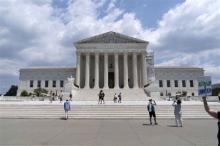
On June 28, the U.S. Supreme Court’s ruling in two cases — Loper Bright Enterprises v. Raimondo and Relentless, Inc. v. Department of Commerce — reversed a bedrock principle of administrative law called the Chevron doctrine. This decision will affect any area that federal agencies regulate, including environmental issues, reproductive justice and internet access too.
Loper Bright and Relentless both stem from disputes between commercial fishers and the National Marine Fisheries Service. The district and appellate courts that initially heard the cases applied Chevron deference, in which courts defer to federal agencies’ reasonable interpretations of statutory authority. However, the Supreme Court reversed the lower courts and invalidated the entire doctrine.
In a baffling move, however, the Court noted that today’s decision doesn’t invalidate prior cases that were decided on the Chevron framework: A whopping 70 Supreme Court decisions and around 17,000 lower-court decisions. The Court’s majority frequently cherry-picks when it decides whether to honor previous court rulings. This came up two years ago in the Dobbs case when the Court overturned Roe v. Wade.
Chevron deference is named for a landmark Supreme Court case from 1984, Chevron U.S.A. Inc. v. Natural Resources Defense Council, Inc. It has been a bedrock principle of administrative law from its inception 40 years ago. It held that Congress delegates certain policy decisions to federal agencies precisely because they have superior expertise and technological knowledge that other branches of government simply lack.
And if there’s any doubt that certain interpretations of complex industries should be left to agencies, we’ll flag that in Ohio v. EPA — issued the day before SCOTUS reversed Chevron — the Court had to issue a corrected version of the opinion. Why? Well, in the original version Justice Neil Gorsuch mistakenly referred to nitrous oxide (laughing gas) instead of nitrogen oxide (the air pollutant at issue in the case).
The disastrous decision to overturn Chevron will impact a vast constellation of agencies and endanger countless regulations: For instance, last week’s ruling could hamper the FCC’s ability to regulate and could impact the conduct of the ongoing Title II litigation, even if it doesn’t change the outcome.
Fortunately, the court battle over Net Neutrality can still be won. Title II is the correct classification for internet access from a technical standpoint and from a common-sense, pro-consumer perspective. But getting there without Chevron deference is a steeper legal hill to climb when the federal bench is hostile to agency regulations.
All in all, this decision is a damaging blow to the integrity of federal agencies’ processes to protect the public.
